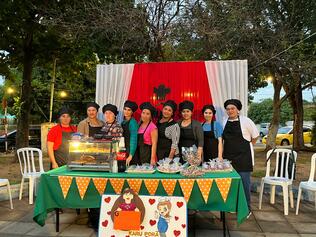Asunción: Neighbourhood School for Citizenship and Work (Escuela Vecinal Ciudadanía y Trabajo)
The Neighbourhood School for Citizenship and Work is an innovation in terms of strengthening the social fabric of local governments with civic and work training for organised neighbours, as it strengthens natural community leadership and provides them with work training to improve their economic conditions.
The initiative is carried out by the Federación de Entidades Vecinalistas del Paraguay (FEDEM Py), a national neighbourhood and community organisation that has managed to position the voice of organised neighbours in the management of local governments.
The practice began in 2014 in the Municipality of Asunción and was extended to 9 municipalities in the Central Department, the characteristics of the practice are as follows:
The task is based on a demand generated by the community itself.
It works with community organisations already formed in Neighbourhood Commissions and Citizen Comptrollers.
The work is carried out in the territory of the neighbourhood organisations.
The topics of the courses to be developed are defined by the community and the directors of the Neighbourhood School for Citizenship and Work.
The courses last an average of 3 to 6 months.
The teachers are community leaders with years of experience in the area of participation, citizenship and local government.
The training methodology is non-formal education and Andragogy.
The action in the territory is evaluated periodically, in order to adjust to the needs of the neighbours.
Thanks to the Neighbourhood School for Citizenship and Work, more than 5000 students have graduated from the Civic Training course and more than 500 people in the field of vocational training.
Communities that have gone through the training process have greater social cohesion, conflicts are reduced to a minimum and this allows for greater community development.
-
21/05/2024 17:29
This proposal Asunción: Neighbourhood School for Citizenship and Work (Escuela Vecinal Ciudadanía y Trabajo) was created
-
18/06/2024 10:29
It became this proposal




Share
Or copy link